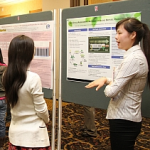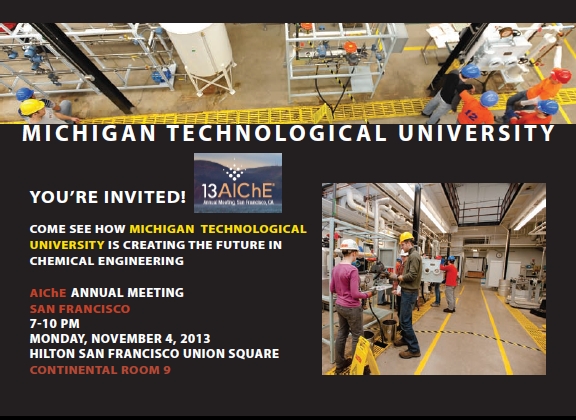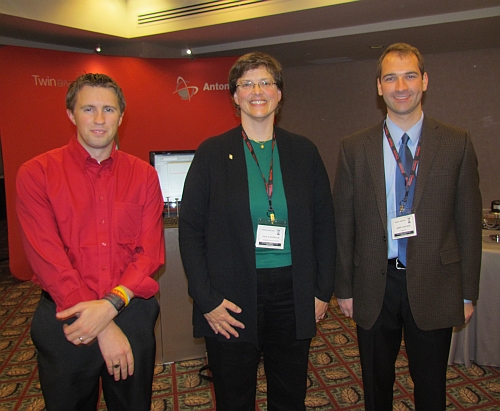The Department of Chemical Engineering conducted its first Order of the Engineer Ring Ceremony on Thursday, April 17. Fifty-four students and faculty were inducted and took a solemn obligation to themselves to “uphold devotion to the standards and dignity of the engineering profession.” The inductees were presented with a stainless steel ring worn on the fifth finger of the working hand to remind themselves of this obligation. KRC Director Jay Meldrum was the keynote speaker and talked about examples of unethical decisions or acts he observed during different stages of his career and the decisions he made.
Professor Faith Morrison serves on the board of American Institute of Physics as representative of the The Society of Rheology. The Institute was created to promote the advancement and diffusion of the knowledge of physics and its application to human welfare. For example, the American Physical Society (APS) and the American Institute of Physics (AIP) jointly-sponsor a STEM Education Policy Fellowship that will fund scientists and educators for up to two years, sending them to the U.S. Department of Education where they will work intensively on education policy and programs related to science, technology, engineering and mathematics (STEM). The AIP Executive Board is meeting this week.

standing are Charles Carter, Kate Kirby, Rudolf Ludeke, Eva Adams, Michael D. Duncan, Louis J. Lanzerotti, Kevin B. Marvel, Beth Cunningham, Judith Flippen-Anderson, H. Frederick Dylla and sitting on the arm of the chair J. Daniel Bourland
 Students from the Michigan Tech National Society of Black Engineers (NSBE) visited seven middle and high schools in Detroit over their Spring Break, March 11-14, 2014, to promote college and engineering to K-12 students. In the evenings, they conducted Family Engineering Night events at three K-8 schools. NSBE’s Alternative Spring Break is conducted in collaboration with the Detroit Public Schools Office of Science and the Detroit Math & Science Center, and funded in part, with a grant from John Deere.
Students from the Michigan Tech National Society of Black Engineers (NSBE) visited seven middle and high schools in Detroit over their Spring Break, March 11-14, 2014, to promote college and engineering to K-12 students. In the evenings, they conducted Family Engineering Night events at three K-8 schools. NSBE’s Alternative Spring Break is conducted in collaboration with the Detroit Public Schools Office of Science and the Detroit Math & Science Center, and funded in part, with a grant from John Deere.
WXYZ Channel 7 news in Detroit aired a feature story about an interview with Michigan Tech NSBE student chapter members in Detroit, working to motivate middle and high school students in Detroit schools to see college in their futures and to study science, technology, engineering and math (STEM).
Read More about Michigan Tech Students Head to Detroit for Alternative Spring Break

 The 2nd Annual Research Forum for Graduate and Undergraduate Students for the Department of Chemical Engineering was held on Wednesday, January 22, 2014.
The 2nd Annual Research Forum for Graduate and Undergraduate Students for the Department of Chemical Engineering was held on Wednesday, January 22, 2014.
View a selection of videos from the 2014 Chemical Engineering Research Forum
See photos from the 2014 Annual Research Forum for Graduate and Undergraduate Students for the Department of Chemical Engineering
Nineteen students from Michigan Tech spent a day in Neenah, Wisconsin touring Kimberly-Clark facilities, meeting with company representatives and alumni, and learning about careers with Kimberly-Clark. The students included members of Michigan Tech’s Society of Women Engineers collegiate section and other professional university organizations. – See more
Today’s university students are reminded to be careful about what they put up on their Facebook or Twitter accounts. Sometimes they forget, and that’s a job for Clean It Up, the winning entry in the fifth annual Bob Mark Elevator Pitch Competition held Thursday night on the campus of Michigan Technological University.
The late business professor Bob Mark created the competition so students could polish their 90-second, new business pitches, emulating the length of an elevator ride.
The brainchild of accounting major Nikoli Wiens and chemical engineering major Zach Eckert, Clean It Up promises to clean up content and profiles on the Internet, even beyond the cleansing that Facebook and Twitter claim to do upon request.
At the Society of Rheology meeting in Montreal Canada in October 2013, Dr Faith Morrison met with James Eickhoff, Michigan Tech class of 2004, and Mark Cieslinski, Michigan Tech class of 2011. James works for Anton Paar, a rheometer manufacturer. He travels all over the world. Mark is a graduate student in Don Baird’s group at Virginia Tech, set to get his Ph.D. in chemical engineering/rheology in two years. Both students took CM4650 Polymer Rheology from Dr. Morrison when they were at Tech.
Adrienne Minerick has developed a new, split-level course that teaches students how to navigate the rocky road of research and real-world problem-solving. She will soon be telling her peers about it at the Frontiers of Engineering Education Symposium, hosted by the National Academy of Engineering.
MORE
 Come visit with our faculty over food & drinks, learn about our innnovative research, our outstanding lab facilities, our undergraduate and graduate education, and how we are creating the future.
Come visit with our faculty over food & drinks, learn about our innnovative research, our outstanding lab facilities, our undergraduate and graduate education, and how we are creating the future.
AIChE ANNUAL MEETING IN SAN FRANCISCO
MICHIGAN TECH RECEPTION
MONDAY, NOVEMBER 4, 2013 • 7-10 PM
HILTON SAN FRANCISCO UNION SQUARE, CONTINENTAL ROOM 9
View Flyer PDF


